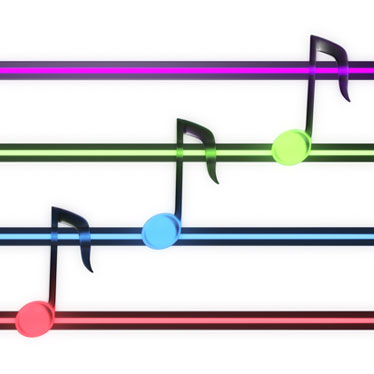7 Ways To Make Practicing Scales Fun

Practicing your scales is the musical equivalent of eating your spinach. You know it's good for you. You know it's part of setting and maintaining the foundation that makes all good things possible. Scales are chock full of healthy musical goodness that help you improve your technique, your ability to play in tune and control your tone, as well as enhancing your sense of key.
Not only that, regularly practicing your scales improves your ability to sight read new music. When you practice scales every day, you'll start to easily identify scale and arpeggio patterns, which means you'll be able to master new pieces more quickly.
Well just because parents can't sneak spinach greens into brownie recipes, doesn't mean you can't find ways to make practicing your scales fun and palatable. Here are 7 ways to do it:
- Write them out: Make them creative and fun. Express the scale visually – how you see the music – so you can appreciate them more fully. Get markers and glue involved and be as artistic as you want. Getting interactive with the scales in a new way can help strengthen your understanding of them.
- Practice scales with a metronome or click track; use different time signatures. Vary the tempo of the scales. Play them at whole notes, then half notes and so on. Play them in triplets. Mess around with the spacing. Play a few notes and then pause, and prepare for the next notes. Slowing down will help you focus on hand placement and tone. Speeding them up will help you get comfortable with your physical technique at faster paces. You can find a bunch of metronome apps here, so you'll never be without.
- Start at the top instead of the bottom. Have you ever sat in a different bus seat than your regular, favorite spot? Maybe on the other side of the bus or facing the opposite direction? All of a sudden – your ride is entirely different. Everything you see. Your perspective has literally changed and you notice new details. Try that with your scales.
- Make it more musical. Pick your favorite song. It doesn't have to be classical music. It could be an old nursery rhyme or commercial jingle – just pick a simple tune. Play the simple tune in the scale you're focusing on, then transpose it for the next scale. Focus on your fingering when you play. Then practice that scale to see how it's helped your technique.
- Get jazzy. You don't have to stick with just major and minor scales. Throw in some modal scales. They'll challenge any technique ruts you're in, expand your skills, and learn how to improvise. Try some pentatonic scales to rock things up. You can test yourself with some chromatic scales as well to really master pitch. You can find a free book of interesting scales here.
- Speaking of improvising… We've already talked about adding some tempo and pauses to your scale playing. Sometimes that can be formal, like deliberately playing each note in quarter time. But you can also switch things up as you play. In addition to switching up spacing and tempo, use different hand placements and bowings. Play with your bow close to the bridge, then move it towards the fingerboard.
- Play them with your eyes closed. I know, we started in exactly the opposite place. That's the point! Part of making scales fun is making them unexpected, since it's their monotony that can kill you. Memorizing scales and playing with them while your eyes are closed will also let you focus on different aspects of the scale than when you're reading and playing.
Excelling at anything takes hard work that seems to have little immediate impact. You won't ever perform scales for an audience, but practicing them will get you in front of an audience playing works you never thought you could handle.
So love your scales, make them fun, and check this post out to refresh some scale basics if it's been a while.


